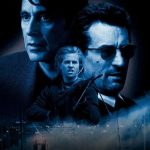The Dark Knight (2008)

“The Dark Knight,” released in 2008, is a landmark film in the superhero genre, directed, written, and produced by Christopher Nolan. This sequel to “Batman Begins” has become a critical and commercial success, praised for its depth, character development, and complex themes. The film not only redefined the superhero movie landscape but also established itself as a cinematic masterpiece that delves into the nature of morality, chaos, and the psychological struggles of its characters.
At the core of “The Dark Knight” is the ongoing battle between Batman, portrayed by Christian Bale, and the anarchic Joker, played by Heath Ledger in an iconic performance that posthumously earned him an Academy Award. The film opens with the Joker orchestrating a bank heist that sets the tone for the chaos he will unleash upon Gotham City. His character embodies pure anarchy, challenging the very principles that Batman stands for. Ledger’s portrayal of the Joker is both chilling and captivating, capturing the character’s unpredictability and dark humor.
The film explores the philosophical conflict between order and chaos. Batman, as Gotham’s vigilante, strives to impose justice and maintain order in a city riddled with crime. However, the Joker’s emergence poses a significant threat to this order. He manipulates events and individuals, pushing Batman to confront the limits of his moral code. The Joker’s mantra that “chaos is fair” serves as a powerful counterpoint to Batman’s belief in justice, forcing the audience to question the very nature of good and evil.
One of the film’s most compelling aspects is its portrayal of duality and the blurred lines between heroism and villainy. Harvey Dent, played by Aaron Eckhart, is introduced as Gotham’s District Attorney, a beacon of hope for the city. However, as the Joker wreaks havoc, Dent undergoes a tragic transformation into Two-Face, representing the fragility of morality. This shift illustrates how quickly one can fall from grace, emphasizing that the line between hero and villain is often thin and precarious.
Nolan’s direction is masterful, employing a gritty realism that immerses viewers in the dark atmosphere of Gotham City. The film’s cinematography, led by Wally Pfister, captures both the sprawling urban landscape and the intimate moments of character conflict. Iconic action sequences, such as the thrilling chase involving the Batmobile and the dramatic showdown on the ferries, showcase Nolan’s ability to balance intense action with character-driven storytelling.

Another key element of the film is its score, composed by Hans Zimmer and James Newton Howard. The music enhances the emotional depth of the narrative, heightening tension and evoking a sense of impending doom. The haunting themes associated with the Joker and Batman reinforce the psychological struggle between the characters, contributing to the film’s overall impact.
The film also raises profound ethical questions about vigilantism and the consequences of one’s actions. Batman’s decision to take the fall for Harvey Dent’s crimes at the film’s conclusion serves as a poignant commentary on sacrifice and the burdens of heroism. It forces the audience to consider whether the ends justify the means and what it truly means to be a hero.

In addition to its exploration of complex themes, “The Dark Knight” features a strong supporting cast, including Gary Oldman as Commissioner Gordon, who embodies the struggle for justice within a corrupt system, and Morgan Freeman as Lucius Fox, who provides Batman with the technological support he needs. Each character plays a crucial role in the overarching narrative, adding layers to the moral dilemmas faced by the protagonists.

In conclusion, “The Dark Knight” stands as a pivotal film in both the superhero genre and cinematic history. Christopher Nolan’s innovative storytelling, coupled with powerful performances and profound thematic depth, elevates the film beyond mere entertainment. It challenges viewers to grapple with questions of morality, justice, and the human condition. As a result, “The Dark Knight” remains a compelling exploration of the complexities of good and evil, solidifying its place as a timeless classic that continues to resonate with audiences around the world.











